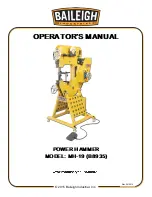
18
ENGLISH
3
Technical Data charger and battery
(F)
Battery:
Charger:
U = Voltage
U1 = Input voltage
C = Capacity
f1 = Input frequency
W = Weight
P1 = Input power
Ic = Charge current
U2 = Charging voltage
t
= Approx. charging time (90% full)
I2 = Max. charge current
Charging voltage ............................
20,75 V DC
Nc = No. of battery cells
Charging temperature .....................
0° - 50° C
W = Weight
Max. discharging temperature. .......
5° - 50° C
Pay attention to the electrical outlet
voltage! Check the label on the bottom
of the charger!
Recharge battery pack before first use!
4
Function of the Unit
4.1
Changing the battery
(A)
Insert battery until the catch clicks into place. (LED flashes briefly = Contact made). To remove
press the catch and take out the battery.
If the required voltage is not delivered by the battery, the LED will flash and a tone se-
quence will be issued during renewed starting. Charge the battery in the charger.
4.2
EMERGENCY STOP Button
(B-1)
If there is any danger to personnel or the machine during the pressing process, press the
EMERGENCY STOP button immediately and release the ON switch. The valve will open and
the piston will return to its initial position.
4.3
To switch on
(B-2)
Press the ON button until the pressing process has been completed. The motor cut out indicates
the end of the moulding cycle.
4.4
To turn the press jaw
(B-3)
The press jaw can be turned through 270° depending on the application.
4.5
LED
(C)
The white LED’s lights up by starting the press cycle (up to 30 sec. after end of the press cycle).
The white LEDs flash:
after 40,000 pressing processes the LEDs flash after every pressing
process as an indication of the need for the next inspection. An internal counter keeps a record
of the number of pressing since leaving the factory.
4.6
To insert the press jaw
(D)
Remove battery!
Open the bolt (1).
Insert the appropriate press jaw for the job in hand (2).
Lock the bolt (3).
After changing the press jaw it is essential to ensure that, once engaged, the crimping jaw
matches the profile being moulded and the nominal width of the fitting being moulded. A visual
inspection must be carried out in order to determine that the press jaw is fully closed at the end
of the press cycle.
Summary of Contents for 368870
Page 3: ...C D LeD Insert Press Jaw 1 3 2...
Page 4: ...e operating 1 2 3 LeD stARt...
Page 193: ...Notes...
Page 194: ...Notes...
















































